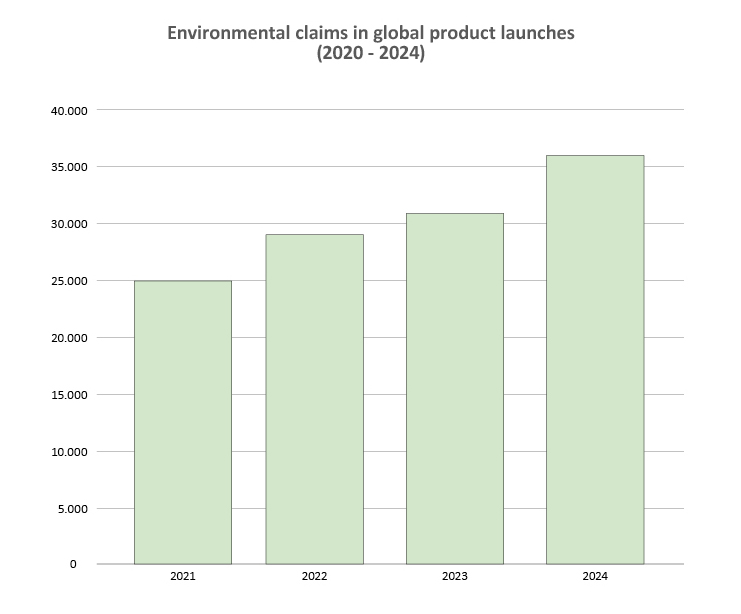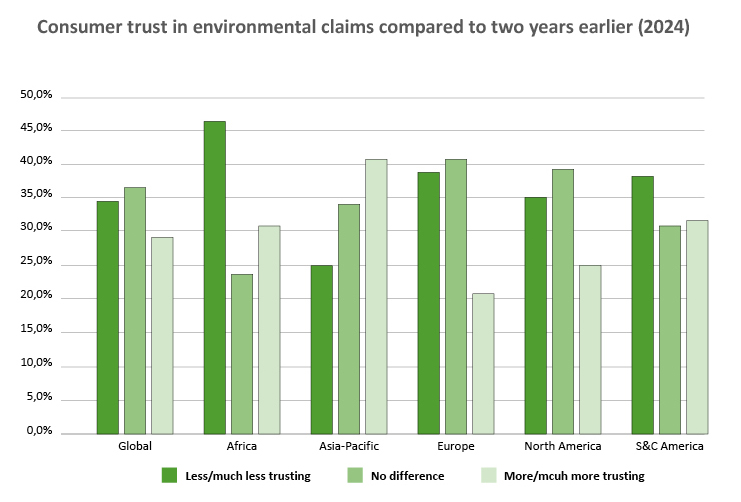Using Product Carbon Footprint data to win over modern consumers
As consumer concerns over the climate grow, sustainability claims have become increasingly widespread throughout the global food and drink industry. However, the rise of “greenwashing,” which involves making misleading eco-friendly claims for marketing purposes, means shoppers now often doubt their authenticity. Discover how using carbon data – backed up with clear communication – can deliver an effective solution for the food and drink industry.

[1]
Consumers are seeking sustainable products
The climate crisis is hitting hard – and the food industry is estimated to contribute more than a third of all global greenhouse gas emissions. [2]
As a result, a significant proportion of global consumers are now actively choosing environmentally responsible food and drink products. A global FMCG Gurus survey [3] found:
- 40% say they have chosen one product over another because it was more environmentally friendly
- 36% say they have made greater efforts to find more environmentally friendly beverage brands
- 36% say they have made greater efforts to find more environmentally friendly food brands
Sustainability scepticism is an issue
While consumers want sustainable food and drink, concerns over greenwashing mean claims can fail to win support. [4]
- 31% say they are sceptical about environmental claims made by brands and manufacturers
- 44% believe brands and manufacturers are not transparent about their environmental initiatives
The FMCG Gurus survey, carried out in 2024, found that levels of trust had declined over the previous two years in all regions except Asia-Pacific.

Product Carbon Footprint data inspires trust
With many sustainability claims now losing their impact, Product Carbon Footprints can provide a more trustworthy option.
PCF figures account for the total greenhouse gas emissions produced across the lifecycle of each product, cutting through the noise of unsubstantiated claims.
- 80% of U.S. consumers said they are more likely to trust companies that back up their sustainability claims with publicly shared data [5]
- 52% of consumers across the U.S., UK, and Ireland said they are more likely to buy a product that includes transparent climate footprint information [6]
- A study of 10,000 consumers across 18 European countries found that more than two-thirds would welcome a universal label signaling the environment impact of food products [7]
Clear PCF communication is key
Product Carbon Footprint data shows consumers that brands are willing to support their sustainability stories with measurable, credible information. While this provides clear advantages, clear communication is vital to maximize the benefits.
A study carried out in China in 2023 shows that the willingness to purchase carbon-labelled products is strong, but public awareness of the carbon-labelling system is relatively low. It suggested companies should use advertising and promotional activities to make the most of the data and trigger consumers’ purchase behavior. [8]
Some brands are already doing exactly that. The leaders in this field are using their PCF as a unique selling point in advertising campaigns and marketing materials, highlighting their confidence in sharing hard data to back their claims.
EXBERRY® delivers on data
Sustainability is a key focus for GNT – and we have the numbers to prove it. We can currently provide PCF data for 98% of our plant-based EXBERRY® color portfolio.
Importantly, we’re currently the only food color supplier with an externally assured Greenhouse Gas Verification Statement for scopes 1 to 3. This is because our unique supply chain approach gives us the visibility we need to provide accurate numbers for scope 3.
EXBERRY® colors are also produced responsibly. We were awarded an EcoVadis gold medal in 2024 for our environmental and ethical activities, with a score that ranks us in the top 3% in the food industry.
In addition, we’ve set out 17 ambitious targets to optimize our environmental and social impacts over the course of the current decade. Every year, we report on our progress in an in-depth sustainability report.
Create consumer-friendly products with EXBERRY®
Created from non-GMO fruits, vegetables and plants, EXBERRY® offers multiple benefits for product developers: vibrant shades, natural ingredient declarations and low impact on overall PCF.
Our Citrus Sunset drink concept highlights how EXBERRY® can be used to create visually appealing, eco-friendly products, contributing just 2.6% of its 0.08 kg CO₂e footprint per liter.
Want to learn more about the benefits of PCF data? Watch our free webinar on demand.

Ingredient list: Water, sucrose, apple juice concentrate, flavors, sweeteners, citric acid, concentrates (safflower, lemon, carrot and blackcurrant)
[1] Innova New Products Database
[2] 34% of global greenhouse gas emissions came from food production (1990–2015) [ADD SOURCE]
[3] FMCG Gurus ‘Custom Survey – Global and Regional – Sustainability’ (Q4 2024)
[4] FMCG Gurus ‘Custom Survey – Global and Regional – Sustainability’ (Q4 2024)
[5] Specright ‘Survey Reveals Consumers Prioritize Purchasing Sustainable Products and Desire Greater Transparency from Companies on [1] [1] [1] [6] Sustainability Progress’ (2023)
[7] Food Industry Executive ‘Consumers Want to Be Climate-Conscious, but Need More Guidance: Strong Roots’ (2024)
[8] European Institute of Innovation and Technology ‚Eco-labelling‘ (2023)
[9] Duan, J. et al. ‘Study on Consumers’ Purchase Intentions for Carbon-Labeled Products’ Sustainability (2023)
